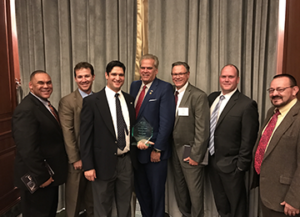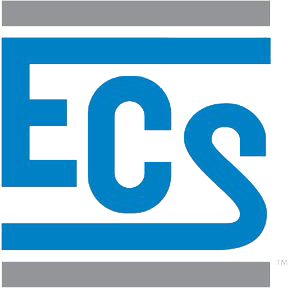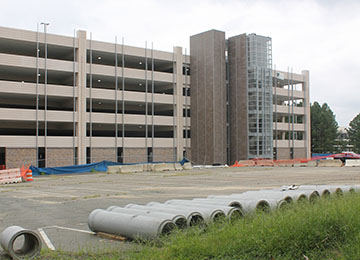Every year, the American Council of Engineering Companies (ACEC) hosts an Engineering Excellence Awards competition, where it chooses exemplary projects from engineering firms across North Carolina to receive recognition. This year, ECS Carolinas, LLP was the recipient of both the Honor Award and People’s Choice Award for their work on the Science Drive Parking Garage in Durham, NC. This marks the tenth time that ECS Carolinas, LLP has received recognition for engineering excellence from ACEC.
Firms: ECS Carolinas, LLP (Geotechnical Engineer-of-Record), Soil and Materials Engineers, Inc., Walker Parking Consultants (Structural Engineer-of-Record)
On the surface, this appeared to be a typical parking garage construction for Duke University to provide more on-campus parking for students and faculty, with ECS providing foundation recommendations to the structural engineer. The apparent simplicity of the project was offset by the structural loading and variable settlement tolerances for portions of the parking garage. To maximize cost savings to the client, ECS implemented highly specialized in-situ testing methods and a detailed engineering analysis to demonstrate the parking garage could be supported on spread footing foundations. The elimination of a deep foundation system (i.e. caissons) and conversion to spread footing-type foundations reduced the overall construction cost of the new parking garage by over $700,000. The nearly three-quarters of a million dollars in savings allowed for additional infrastructure improvements and other benefits to Duke University that would not have otherwise been possible.
Many geotechnical consultants in North Carolina limit the use of spread footing foundations to isolated column loads of less than 400 kips. ECS’s innovative use of the in-situ pressuremeter and detailed engineering analysis allowed the support of this heavy structure on shallow spread footing foundations.
Geotechnical Engineers can routinely fall into the traditional “box” of providing foundation recommendations based on typical N-value correlations and conservative estimates. This project is a successful application of Geotechnical Value Engineering: looking outside the box for specialized in-situ testing methods and detailed analysis that could potentially save the client hundreds of thousands of dollars in construction costs related to foundation systems.


